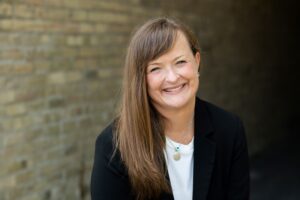Breaking myths and empowering women about menopause

Ann Marie McQueen, Founder of Hot Flash, discusses her inspiration to launch Hot Flash inc, how she helps women navigate through perimenopause & menopause and the most common myths about menopause she aims to debunk.
What inspired you to launch Hot Flash inc in June 2020?
In my early 40s I hit a wall. I started having recurring nightmares, waking up every night gasping and freaking out. If I was able to get back to sleep, a heavy sense of doom would wash over me a second or two after I opened my eyes. I was having intrusive thoughts – my house burning down, I missed something major at work, my family members weren’t safe – and these would send a sheet of fear ripping through me. I had lots of physical issues: crazy headaches, heart palpitations, body pain and sharp chest pains, the kind that sent me to the ER at 3am, only to have a full cardiac workup finding nothing wrong. I’d feel tingling all over my body, smell things burning that were not and regularly get a really strange whooshing feeling in my head. I developed really bad health anxiety and really thought I was dying.
I must have seen a dozen doctors of all kinds, and no one mentioned perimenopause. When I skipped my first period at 47, I realized what was going on. But I tried to find information and nothing resonated with me. It was all polarized, produced by people selling something, or very, very basic. I thought I could bring my passion for content, 30 years of experience as a journalist, experience in health and wellness coverage and what I’d been through to help other women do the most empowering thing of all: be fully informed about what is happening to them so they can find the right experts and make great decisions about their own care.
I also strongly felt that this space was about to break wide open and it turns out, it really did!
Could you explain the significance of recognizing the denial stage in the early phases of perimenopause?
Look, no one mentioned perimenopause to me in all those doctor’s visits. But in my mind, menopause was something that would happen on a far-off day when maybe I was in my 60s. The average age is around 51 and perimenopause can start a decade or more before that. And no woman who is 41 wants to even think about this. We were 25 and we blinked and now this? It’s all wrapped up in our fear of aging.
Also many women in their late 30s or early 40s are still thinking of having children, or having more children, and they don’t understand that is still possible. I see it with my younger friends now, who know I devote a ton of time to this topic yet will still argue that their problems sleeping have nothing to do with their hormones, or that their anxiety really is just because of work. Maybe it is; all I’m saying is what if it isn’t? Once I wrapped my head around the fact that I was in perimenopause, and it didn’t happen all at once, everything got easier. I’m 53 now and I can absolutely say: it will all be okay. But you need to get honest with yourself first.
How do you help women navigate through the confusion surrounding perimenopause and menopause?
My north star is helping women be the CEO of their own health, reminding them that this is not the time to put all their faith in their doctor – many who know very little about this transition – online gurus or in people who relay information who are in a clear conflict of interest. (For example, companies that sell hormone therapy, or doctors who run lucrative private practices prescribing it). We are really in the middle of this, because when it comes to research, only a 10th of the studies have been done on menopause that have been done on pregnancy – 96,000 on something all women go through, compared to 1.1 million – and menopause happens to everyone. We haven’t begun to understand this.
This is the time in our lives to take radical responsibility for everything about our health. To start to understand what is happening, why, and how to best deal with it. Menopause is a very individual thing: some women have no symptoms, others suffer terribly. There are tribes that have been studied, the Hazda in Tanzania, for example, who experience almost nothing at all and don’t even have a word for menopause. That, and the small amount of research that has been done so far, tell us that a lot of what we experience has to do with what’s going on around us and what we bring with us. Stress, undiagnosed chronic conditions, poor gut health, poor lifestyle habits, no experience processing difficult emotions, trauma and grief, chronic dieting, overwork or over-exercising – the list is long. When all this is combined with the hormonal fluctuations of perimenopause, we can be quite vulnerable to a host of new health problems: pre-diabetes, fatty liver and high blood pressure. We need to keep on top of this and address the root causes, so we can transition through menopause in good health. I actually think women need to start tracking their own blood work at this time, in the same way we should be tracking our finances.
What are some of the most common myths about menopause that you aim to debunk?
- Hormone therapy is dangerous and it’s perfectly safe
We have a pretty good body of evidence that bioidentical or biosimilar hormones are safe within a 10-year window of the onset of menopause. The major guiding bodies around the world recommend menopause hormone therapy for the treatment of symptoms, and this was most recently backed up by a The 2023 Practitioner’s Toolkit for Managing Menopause, a systematic search for guidelines, position and consensus statements published in the journal Climacteric and endorsed by the International Menopause Society.
However, now that menopause awareness has grown, and with it an entire space has become a business opportunity, we have a number of social media stars – I like to call them Doctor Menopause Gurus – who are prone to ‘HrT hype’, recommending it for all sorts of unproven things and ignoring that it comes risks and side effects that every woman needs to weigh individually.
- It shouldn’t be happening, or it’s new
I hear people who should know better saying that menopause is only 100 years old and that we all used to die at 50, which is nonsense. There are references to menopause throughout history, and while our life expectancy used to be much shorter, many women lived to old age. While people are still working out exactly why we live long past our reproductive years, from a biology perspective, what we know for sure is we do, and we always have.
- Only women and whales go through it
This is repeated so often! But in recent years we have research indicating giraffes, elephants and chimps do too. In October 2023 two researchers in Germany looked at the research and determined that about 80 percent of creatures make this transition. That’s a mind-blowing reversal of what was previously thought.
- Bioidentical hormones and compounding pharmacies are a scam
I think one of the most confusing points for women is an ongoing argument over bioidentical, or biosimilar, hormones produced in compounding pharmacies, versus those that are mass-produced and approved by regulatory agencies.
Very broadly speaking, these days if you are getting estradiol in a patch, gel or spray, then it is in a form closest to what your body produces, and generally considered safer. If you have a uterus, then you need to take progesterone or a progestogen with it. Oral micronized progesterone is also in the form closest to what your body makes, while ‘progestogens’ are synthetic, and becoming increasingly associated with many of the risks associated with hormone therapy.
If you are getting bioidentical hormones from a compounded pharmacy, then it’s also estradiol and progesterone. It’s common to hear “bioidentical” referred to as a marketing term and also to suggest that compounding pharmacies are unregulated and unsafe. But compounding pharmacists are highly trained and their pharmacies are regulated – although their individualized preparations are not. Millions of women use them to great effect, and often they work for women who have adverse reactions to some of the additives in commercially produced products.
The mass-produced hormones are more likely to be covered by insurance, and as best as I can determine, most of this boils down to two industries in competition with each other.
- Menopause happens when you are old
No one is ever ready for menopause, and when you pass through menopause, if you are lucky, you have a third or more of your life ahead of you. We are now in the ‘millenopause era’, meaning that the upper and middle members of this 27 to 42 age bracket are either on the cusp of or already experiencing perimenopause.
In what ways has menopause evolved, making it different from what previous generations experienced?
Gen X has blown this space wide open. We just aren’t cool with more shame and stigma you know? It’s simply the end of our fertility and a transition to a new phase of our life. It can get pretty rocky for awhile there,, and we just don’t understand why we don’t have better care and more options for dealing with it. Not to mention some accommodations made for us at work, and to be able to speak openly. Women are so wise, experienced and valuable by the time they hit their 40s and 50s. We recognize that ageism is the last ism, and we want to be the last generation who has to deal with it. Many of us are just recognizing our worth individually, which means it’s happening on a mass scale too. We aren’t going anywhere, and our refusal to be silent about menopause is part of a larger trend.
Image Credit: Hot Flash Inc.











Comments